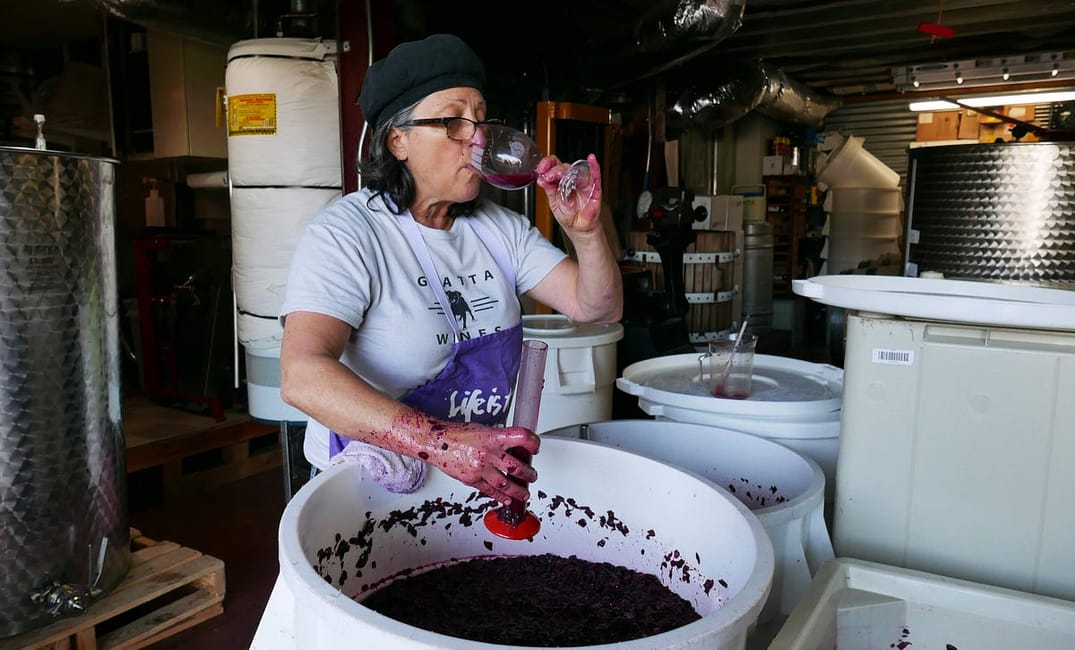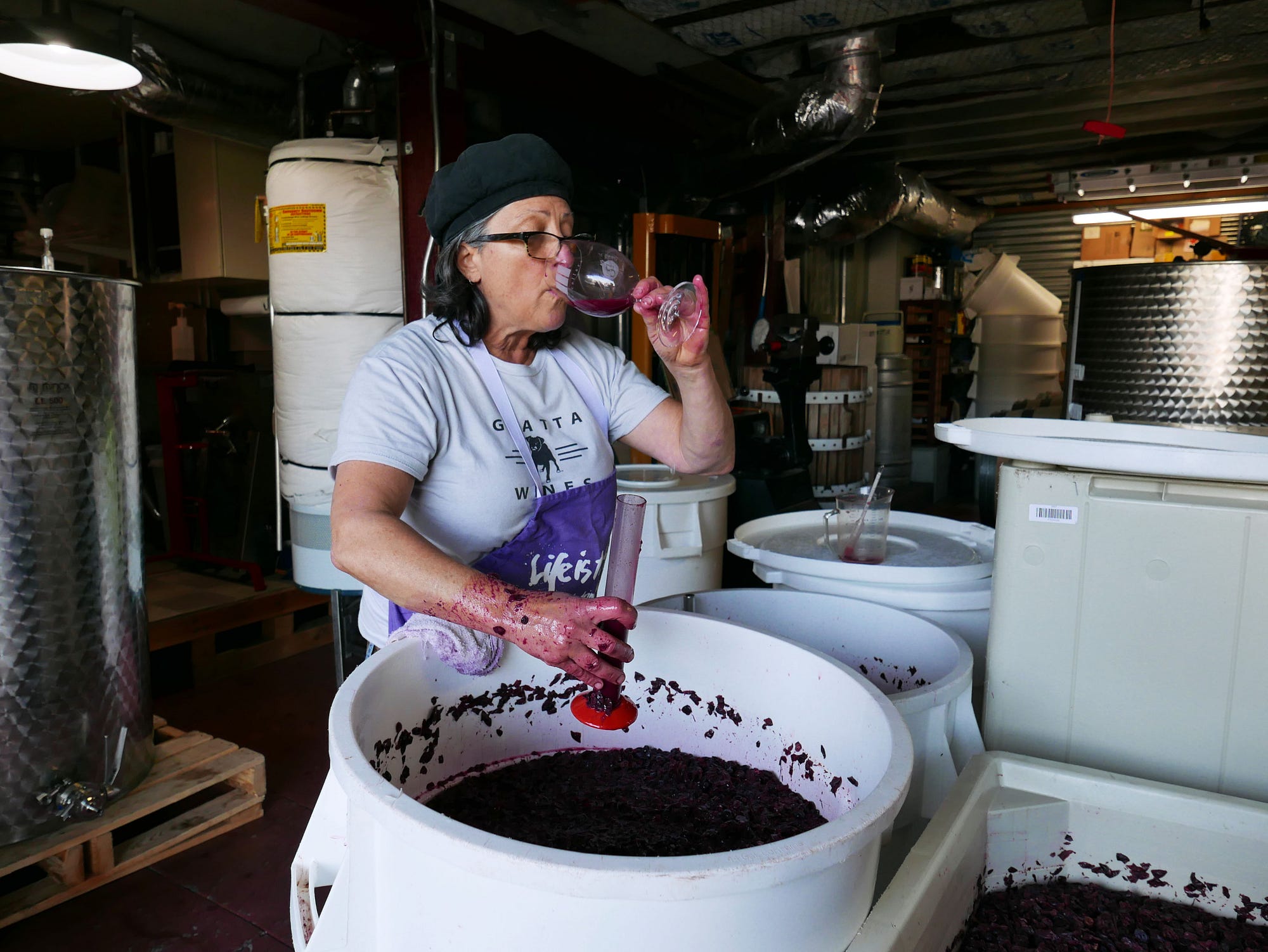
All photos by Nico Vera
Off of one of Bayview’s residential streets, Barbara Gratta hasn’t been able to park in her one-car garage for over a decade. That’s because she’s using the space to run the only commercial garage winery in San Francisco.
The simple yet expert operation has been outfitted with all the gear needed to make wine in an urban setting: a grape crusher, a press to extract the juice, fermentation bins and wooden barrels. At this time of the year, there’s an aroma of ripe fruit as fermented grapes sit in large bins waiting to be pressed and aged.
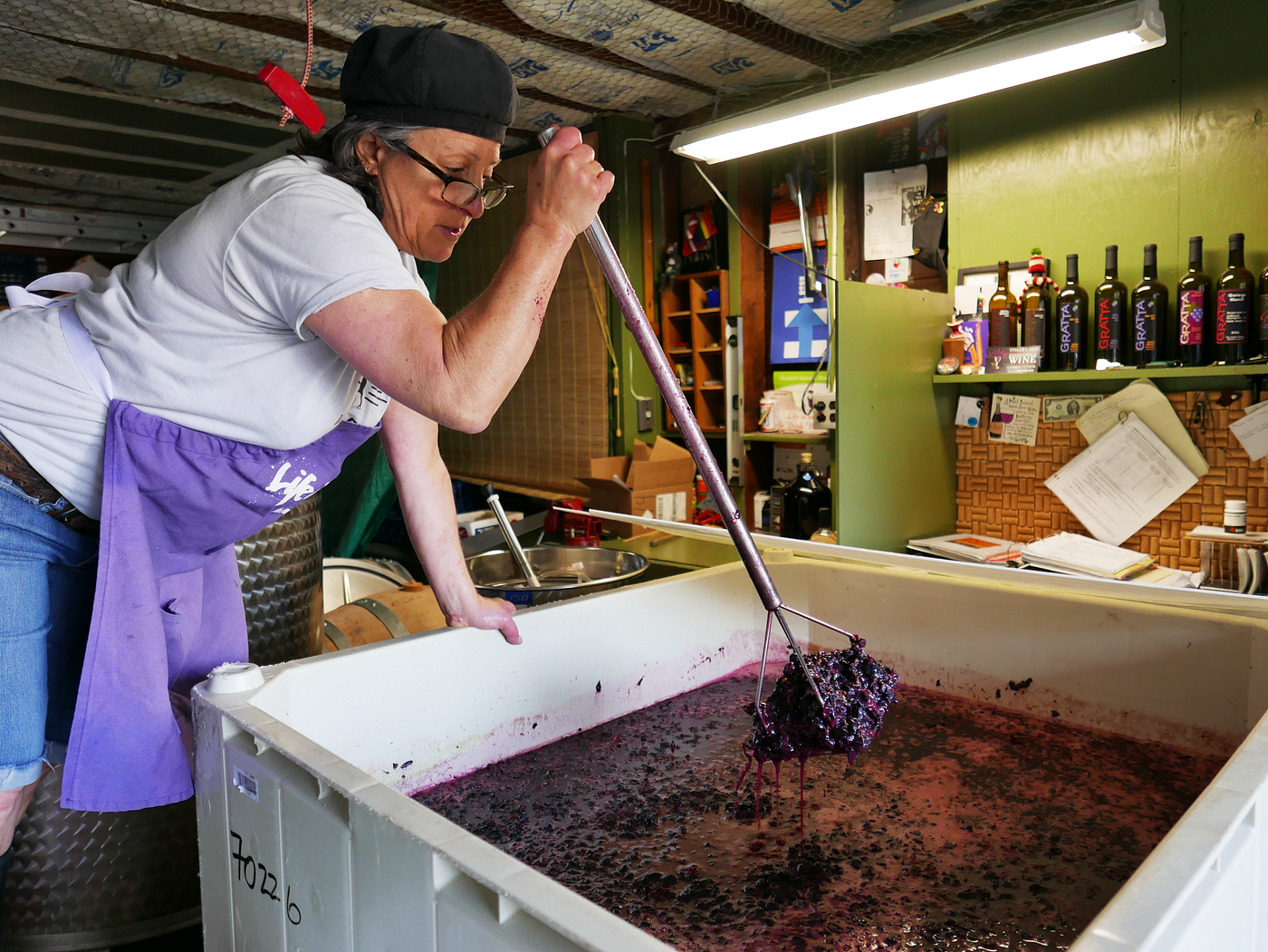
“I love this season,” said Gratta, 57, who has established herself as a standout producer in California and a beloved community figure. “There’s that cellar smell, a mustiness to wine and wood.”
The production facility is currently in a separate area from Gratta’s bustling tasting room, which sits on Third Street in the heart of the Bayview and has become a favorite gathering spot in the neighborhood. But by next fall, she’s planning to move out of the garage into a larger winemaking space closer to the business.
Today, she makes and serves wines that honor her Italian roots, but she also uses the leftover seeds, skins and stems to distill grappa, a centuries-old pomace brandy from Italy.
Gratta first started making wine as a hobby when she moved to her Bayview home in 1999. It wasn’t until 2006 that she obtained a permit to convert her garage into a commercial winery — not an easy feat with residential zoning restrictions. Then, in 2015, her city district supervisor worked to change legislation that allowed her to open a tasting room, which shares a building with local bakery Fox and Lion Bread. Today, it often hosts pop-ups that feature local food, such as pupusas, lasagna, BBQ or wonton soup, as well as open mics with music or poetry.
Thursday through Sunday, you’ll find Gratta standing behind the seven-seat bar in her uniform black hat and black T-shirt with her winery’s logo — her hands usually stained purple. Today, she makes and serves wines that honor her Italian roots, but she also uses the leftover seeds, skins and stems to distill grappa, a centuries-old pomace brandy from Italy.
Chula Camp, a third-generation San Franciscan and one of the first chefs to collaborate with Gratta, serves small savory bites such as vegetable-soup shots or poultry meatballs at the tasting room on the second Saturday of each month.
Bayview has a history of home winemaking. Even Gratta’s neighbors have discovered winemaking artifacts or concrete fermenting vats in their own garages from years past.
“Barbara is generous and enthusiastic about neighborhood projects — she inspires people to work together,” said Camp. “We have a saying—‘We are Bayview.’ We are artists, farmers, gardeners, food purveyors, winemakers and entrepreneurs.”
Gratta said she feels an affinity for her neighborhood, one that remains diverse despite gentrification throughout the city, and one with a strong history.
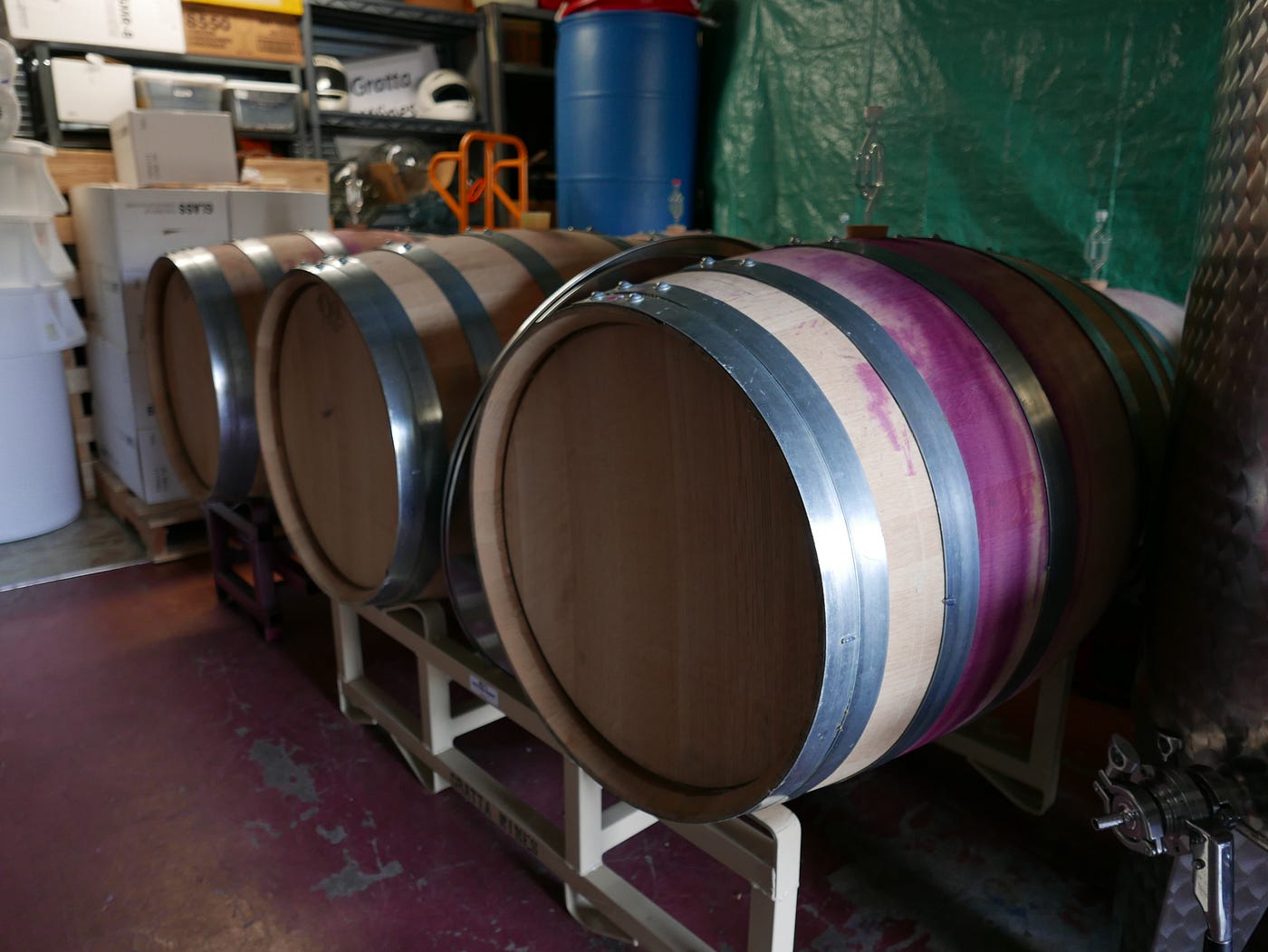
“Bayview reminds me very much of where I grew up in New York — it was a mixed neighborhood, African American, Italian, Jewish, Latino — and moving here felt very familiar to me,” said Gratta. She also fit in because the Bayview has a history of home winemaking. Even Gratta’s neighbors have discovered winemaking artifacts or concrete fermenting vats in their own garages from years past.
It’s little known that from Prohibition to the present, home winemaking has been a part of San Francisco’s history. Of course, few, if any, have made the jump from home vintner to licensed commercial winery like Gratta Wines has. But the practice has existed ever since missionaries cultivated the first vines in California and fortune seekers imbibed grape brandy during the Gold Rush. Not even Prohibition stopped the booze from flowing in the city, as Italian families continued to make clandestine vino and grappa in their cellars.
After the repeal, wineries resumed production, and a grape surplus created a home winemaking boom in the late 1940s. According to Erica J. Peters of the Culinary Historians of Northern California, wineries brought excess grapes to farmers’ markets, and Macy’s even sold winemaking kits to aspiring home enthusiasts. Some wineries also drove trucks full of grapes to homes in San Francisco, where they crushed and sold the grape juice to winemakers.
Wineries don’t deliver to the city anymore, so Gratta rents a truck, drives to vineyards in Dry Creek and brings back half-ton bins of grapes to her Bayview garage, where she makes Sangiovese, Zinfandel and Cabernet Sauvignon, among other varietals.
“Grappa was on the shelves in my family home. My father would drink it often in his coffee.”
Gratta’s winemaking process is quite traditional—crushing the grapes, adding yeast to kick-start the fermentation and extracting the juice with a press before storing it in wood barrels for aging. Most wineries stop there, but there’s a next step for her—making grappa , a relatively new endeavor for her.
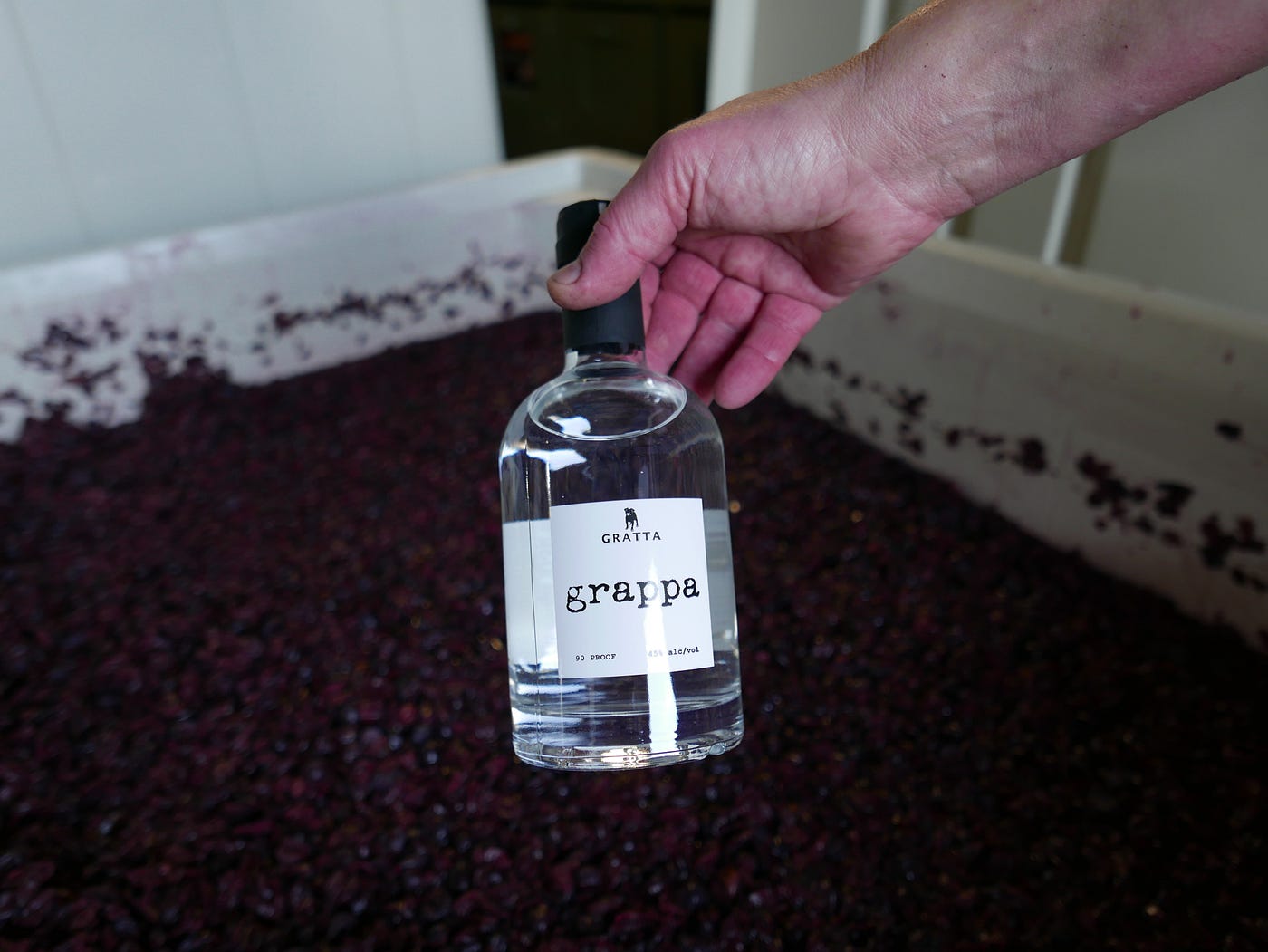
“The remaining pomace, leaves, skins, yeast—all of what’s spent from the press goes to the distillers, so there’s no waste,” said Gratta. “Grappa was on the shelves in my family home. My father would drink it often in his coffee.”
To make grappa, she partners with local whiskey distiller Seven Stills, which uses her Sangiovese pomace, adds water and then uses a steam-heat source and a hybrid pot still to run a single distillation. The end result is a clear high-proof spirit that is diluted with water to 45 percent alcohol by volume. Potter explained that the process is iterative and that the grappa is getting better.
“We’ve tweaked the process every year,” he said. “The single-distillation reflux column method has produced the cleanest distillate while still retaining the Sangiovese’s character.”
Gratta has received many awards and recognition. Her 2013 Sangiovese won gold at the International Women’s Wine Competition in Sonoma, but her wine production is limited due to zoning restrictions. That’s part of the reason why she’s moving production to a larger space—to meet the increased demand for her product.
“It is a little bittersweet for me to move out of the garage, because I’ve been making wine here since I moved into this house,” said Gratta. “I’m happy when I’m in this garage — there’s just this sense that comes over me that is comforting.”
Gratta believes that although it’s time to move on, she’s left her mark on the space.
“You’ll always be able to smell that essence in here. I think it’s just leached into the concrete floors,” she said. “But now I’ll be able to move my car back into my garage.”
Hey! The Bold Italic recently launched a podcast, This Is Your Life in Silicon Valley. Check out the full season or listen to the episode below featuring Eileen Rinaldi, CEO and Founder, Ritual Coffee. More coming soon, so stay tuned!



